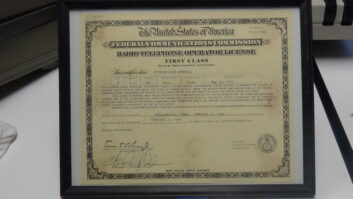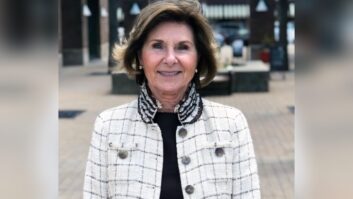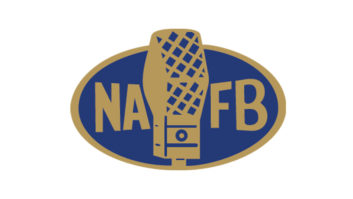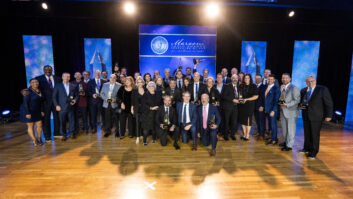IBADAN, Nigeria — Educating Africa’s children is a real challenge.
Due to factors such as poverty, corrupt governments, along with military conflict on many parts of the continent, many children are getting a substandard primary school education.

Auntie Mo’s Opeyemi, left, and Mobola (female) singing for the kids.
Credit: Auntie Mo Kids Radio
“There are 12 countries in Africa — namely Malawi, Zambia, Ivory Coast, Ghana, Benin, Nigeria, Chad, Ethiopia, Congo, South Africa, Namibia and Comoros — in which 30 percent or more of children do not meet a minimum standard of learning by grades four or five,” said The Borgen Project, a nonprofit group advocating to make poverty reduction a major part of U.S. foreign policy. “In countries such as Ethiopia, Nigeria and Zambia, over half of in-school students are not learning basic skills by the end of primary school.”
Taking action to educate lower-income children — especially those without access to schools — is the goal of Auntie Mo Kids Radio, a nonprofit 24/7 internet radio station aimed at African children and their parents. Featuring a nonstop menu of spoken children’s stories, educational information programs, music, and advice programs aimed at parents (and recorded by them as well), Auntie Mo Kids Radio is helping to bridge Africa’s educational shortfall; one listener at a time.
“Auntie Mo Kids Radio is more than a website,” said station founder/creative director (and children’s author) Rotimi “Timi” Ogunjobi. “It is an evolving educational system.”
WHY INTERNET?

Auntie Mo’s Mobola, left, and Opeyemi brainstorming for a recording session.
Credit: Auntie Mo Kids Radio
At first glance, it may seem strange that an educational outlet dedicated to reaching African children is transmitting via the internet, rather than using radio broadcasting. However, the truth is that internet penetration is growing in Africa. In fact, Nigeria leads the continent by having 91.88 million internet users as of March 2017, out of a population of 186 million. (Source: www.statistica.com).
“More than 50 percent of communities in Africa potentially have access to the internet either through computers or mobile devices including phones,” said Ogunjobi. “If you pair a mobile device streaming audio from the internet, with some other inexpensive device such as a personal FM transmitter, an internet radio can broadcast locally to nearby FM radio sets. This means that an entire class of children could receive free, good quality education and entertainment everyday from Auntie Mo Kids Radio.”

Opeyemi, left, and Mobola working out program details for their Auntie Mo content.
Credit: Auntie Mo Kids Radio
But why not reach these children directly via FM broadcasts, rather than starting with internet-based distribution? The answer is money: Although radio receivers are ubiquitous and certainly less expensive than cellular phones in Africa, radio transmitters are not. For a nonprofit such as Auntie Mo Kids Radio — which operates on a shoestring budget — building and operating a conventional radio station is not economically possible at the present time. But creating and running a software-based station using a computer and the web is not.
“It is not perfect and not adequate, but internet radio was the cheapest solution that offered itself,” Ogunjobi said. “Making the streaming available only via a computer browser is quite limiting, if accessibility is a concern. But now that internet-enabled mobile devices are getting cheaper and more popular, new vistas are being opened to potential listeners.”
WHAT’S ON

Auntie Mo founder Rotimi Ogunjobi recording a story for the station.
Credit: Auntie Mo Kids Radio
Timi Ogunjobi’s approach to programming Auntie Mo Kids Radio is based on his knowledge of effective childhood educational strategies, and how they are frequently frustrated by Africa’s economic conditions and cash-poor school system.
“Storybooks and songs are especially important to a child’s development: They build reading and comprehension skills, excite the imagination and initiate creativity in children,” said Ogunjobi. “But to the average African child, books are rarely a priority purchase because they are typically unaffordable. Good quality instructors are also few, and equally expensive.”
This is why reading stories — particularly locally-written stories that are culturally relevant to African children — is a big part of Auntie Mo’s daily programming. So are educational programs that look at the world from an African point of view; plus popular music, and songs that the children can sing along to.
For parents, Auntie Mo offers advice programs on all aspects of raising kids successfully; including content that is recorded by parents themselves through the station’s website. To speed the production process, the website offers practical recording and content advice to contributing parents. “What is in this for you? Promote your knowledge,” said the Auntie Mo ‘Positive Parenting’ web page. “You never know, someone influential may be listening!”
Currently, Auntie Mo Kids Radio only offers prerecorded content on its internet radio station. “We plan to add some live scheduled programming soon, especially with the parent-related programs,” said Ogunjobi.
As for working facilities? At present, volunteers in a small Ibadan office put together Auntie Mo’s content. “For equipment, we make use of mics, mixers, ADC audio converters, computers with DAW software; and of course, efficient internet modems and huge storage devices,” Ogunjobi said. “When we decide to go entirely live, we will obviously need to purchase more equipment; but right now we have an optimum configuration of facilities.”
Staffing is similarly tight: “Together with me, there are only four people working permanently on Auntie Mo Kids Radio — mainly in production and programming,” he said. “To read the children’s storybooks, we call in a couple of voice artists once in a while.”
PROGRESS AND CHALLENGES

Auntie Mimie, Auntie Mo’s namesake inspiration, at the orphanage.
Credit: Auntie Mo Kids Radio
Since it launched in July 2017, Auntie Mo Kids Radio has been making progress in building an audience.
“The number of listeners is rising every day, and from all parts of the world,” said Timi Ogunjobi. “Since we published our mobile apps (for Apple and Android), the number of daily listeners has increased more than tenfold. We are optimistic that we may achieve our initial goal of 500,000 monthly listener-hours by the end of the year.”
Auntie Mo Kids Radio has also gained a degree of financial support from the CISTD Foundation, a nongovernmental agency, but more money is sorely needed.
“Finance is the primary challenge,” said Ogunjobi. “Auntie Mo Kids Radio is a public service project and not a commercial venture. Looking for investors is out of the question, so we need to talk more to possible donors or have more talk to us,” he said.
“Content development is also a challenge,” he added. “We started up with more than 60 percent borrowed content, which we aim to reduce to a maximum of 30 percent within six months. But content development costs money. We also need to promote the station like everyone else; buy web ads and other promotional resources — but you get it; money answers all problems. The road plan is there, the needs are there, and the talent is eager, but how do we pay the bills?”
WHO IS AUNTIE MO?
Pictured, left to right, are August, engineer; Blessing, editor; Auntie Mimie, grand patron; and Rotimi Ogunjobi, founder.
Credit: Auntie Mo Kids Radio
Despite these many challenges, Auntie Mo Kids Radio is soldiering onward; offering 24/7 content to African children and their families wherever they may be.
This fact leaves just one more question to be answered: Who is Auntie Mo?
Well, initially Ogunjobi had planned to name the station after a good friend he calls “Auntie Mimie.” He says he found however that most children struggled with saying the name. “Words that come easy to us may be so much a challenge to these little ones. If you are planning to sell your brand to kids, do make sure they are able to pronounce the name; or else it is all money down the drain,” he asserted.
“One day however, while visiting a local kindergarten, I heard the kids chanting one of their nursery songs: ‘One man went to mow … went to mow a meadow.’ “After they were done I pulled aside a two year-old girl and asked her to sing me the song once again. ‘One man auntie mo,’ she awkwardly but unabashedly began. I had the name I had been looking for!”
James Careless reports on the industry for Radio World from Ottawa, Ontario.












